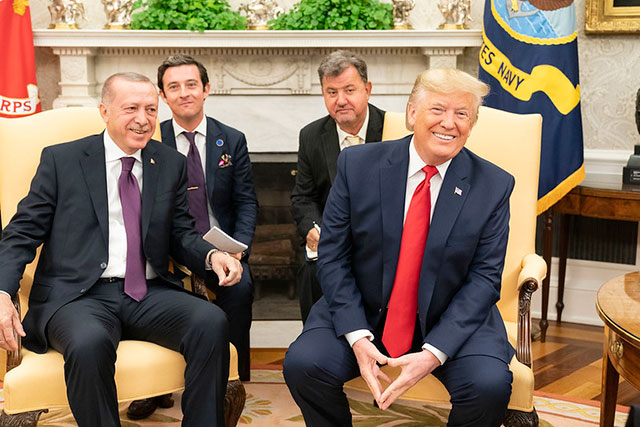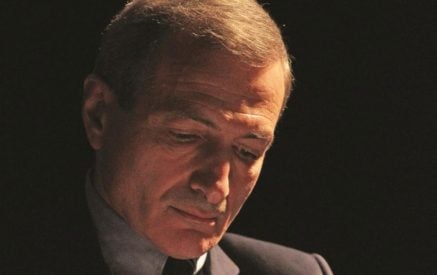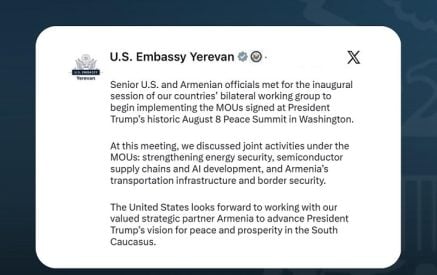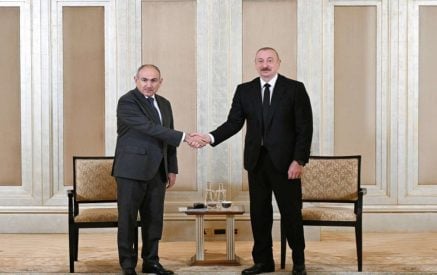By David Boyajian
American presidents have habitually kowtowed to Turkish demands.
However, President Trump’s business investments in Turkey, Turkish-tainted associates, and baffling deference to President Erdogan spawned an exceptionally troubling record.
That record could provide additional fodder for Trump’s Republican, Democratic, and Justice Department (DOJ) foes, especially as Turkey remains a rogue NATO member and supporter of international terrorism.
Read also
Below is a mere fraction of the dismal Trump-Turkish saga.
A Little Conflict of Interest
“I have a little conflict of interest” regarding Turkey, admitted Trump in 2015.
Indeed, since 2012, Trump Towers/Mall in Istanbul has earned him a reported $10 million in naming rights.
Mehmet Ali Yalcindag is Trump’s Turkish partner in that venture. He’s chaired the Turkey-U.S. Business Council (TAIK) — linked to the Turkish government — since 2018. He was also reportedly an intermediary between Berat Albayrak (Erdogan’s shady son-in-law) and Jared Kushner (Trump’s son-in-law).
In 2020, Yalcindag’s letters to Trump’s Agriculture, Commerce, and Energy secretaries lobbied for increased business with Turkey. Yalcindag conspicuously cc’d Trump, thereby apparently (and inappropriately) leveraging their business partnership.
From 2013 until late 2020, DC’s Mercury Public Affairs served as TAIK’s registered Turkish foreign agent.
Following Trump’s inauguration, Mercury hired his communications director, Bryan Lanza, and registered him as a Turkish agent. Ballard Partners, headed by top Trump fundraiser Brian Ballard, also soon became a Turkish agent.
Donald Jr.’s Post-Thanksgiving Turkey Trot
Donald Trump Jr. went hunting in Antalya, Turkey right after his father’s election.
Accompanied by an unnamed businessman — Yalcindag, allegedly — Donald Jr. bagged two wild goats.
The self-indulgent trip to a repressive country highlighted the Trump family’s Turkish blind spot.
Erdogan’s Capital Thuggery
On May 16, 2017, Erdogan ordered his bodyguards to attack peaceful protesters outside his ambassador’s residence in Washington, DC. Erdogan had met Trump earlier that day.
The mostly American demonstrators were stomped and bloodied. Several were hospitalized. A policeman was injured.
The U.S. House unanimously demanded prosecution of Erdogan’s bodyguards.
Trump, in contrast, remained shamefully silent.
That August the DOJ charged over a dozen of Erdogan’s goons. However, they’d long since returned to Turkey on Erdogan’s order.
Scandalously, in 2018, the DOJ dropped charges against several of the bodyguards one day before Secretary of State Rex Tillerson visited Ankara.
Erdogan and his goons won. Americans lost.
Trump, Giuliani, and Zarrab/Halkbank
President Trump allowed former NYC mayor Rudy Giuliani to lobby for Turkey’s interests and against America’s.
Giuliani, a longtime Trump surrogate, was a partner at the Greenberg Traurig law firm from 2016 to 2018. It was a registered Turkish agent from 2017 to 2020.
Trump hired Giuliani as a cybersecurity advisor just before the 2017 inauguration.
In 2016, the Feds indicted Reza Zarrab, a filthy rich Turkish-Iranian-Azerbaijani citizen, for violating U.S. sanctions against Iran through Turkey’s Halkbank. The latter is majority-owned by Turkey, close to Erdogan, and was also a target of Federal prosecutors.
In February of 2017, Giuliani represented Zarrab in a meeting with Erdogan.
For Trump appointee/confidant Giuliani to advocate for Zarrab while Trump’s DOJ was prosecuting the scoundrel smacked of a conflict of interest. Yet Trump let Giuliani plow ahead.
In early 2017, Giuliani pressed the DOJ to make “some agreement” with Turkey to bring about Zarrab’s release.
On March 11, 2017, Trump mysteriously fired Preet Bharara, the U.S. attorney for Manhattan who had been prosecuting Zarrab. The president also fired (June 20, 2020) Bharara’s successor, Geoffrey Berman, allegedly for continuing to prosecute the related Halkbank case.
Trump asked Secretary Tillerson to pressure the DOJ into dropping the Zarrab case. Tillerson rightly refused.
At Erdogan’s behest, Trump also reportedly asked Attorney General Bill Barr and Federal prosecutors to go easy on Halkbank.
Turkey’s interests trumped America’s.
Trump’s Belated Sanctions
Congress’s CAATSA law (August 2017) required America to penalize foreign entities doing business with Russia’s defense industry. Having bought Russian S-400 missiles, Turkey was an obvious offender.
Yet Trump brazenly ignored CAATSA until December of 2020 when Congressional pressure grew too great.
Since S-400s can snoop on America’s F-35 jet technology, the Pentagon insisted on Turkey’s removal from the F-35 program.
However, only in 2019, and after repeatedly making excuses for Erdogan’s buying S-400s, did Trump bar Turkey from acquiring F-35s.
Michael Flynn‘s Turkish Escapades
Retired Lt. Gen. Michael Flynn, a former Defense Intelligence Agency director, was a Trump campaign advisor and Trump’s first National Security Advisor (NSA).
Flynn lasted just 22 days as NSA because he’d misled Vice President Mike Pence about his conversations (December 2016) with Russian Ambassador Sergey Kislyak.
On July 15, 2016, Flynn publicly supported the attempted Turkish coup against Erdogan.
Yet on November 8 (Election Day) Flynn’s article in DC’s The Hill made a U-turn. Flynn defended Erdogan and thundered against Fethullah Gulen, the Pennsylvania-based, expatriate Turkish cleric whom Erdogan blamed for the coup. Why?
Perhaps because that summer and fall, the Flynn Intel Group was paid over $500,000 by TAIK Chair Kamil Ekim Alptekin and his Inovo BV — a firm linked to the Turkish government — to work for Turkish interests and against Gulen.
Under pressure, Flynn registered retroactively as a Turkish agent in March of 2017. The DOJ eventually dropped charges against Flynn related to his talks with Amb. Kislyak. Trump pardoned Flynn in 2020.
Did Trump hire Flynn as NSA precisely because of Flynn’s partnerships with TAIK, Alptekin, and Turkey? It wouldn’t surprise us.
Trump Endorsed Dr. Mehmet Cengiz Oz
Dr. Mehmet Oz is a popular TV show host and a GOP candidate for the U.S. Senate in Pennsylvania.
He’s not a conservative. At best, he’s moderate or even liberal on abortion, gun control, and LGBTQ.
Curiously, though, this April Trump endorsed Oz over his unquestionably conservative GOP primary opponents, Kathy Barnette and David McCormick.
Trump had previously endorsed Sean Parnell for Senate. Only after Parnell dropped out on November 22, 2021 did Oz enter the race.
Oz is an American-born Turkish citizen, served in the Turkish army, and voted in Turkey’s 2018 election. His campaign’s financial disclosure omitted his condominium in Fairview, New Jersey, occupied by two controversial Turkish nationalists.
Trump’s Secretary of State, Mike Pompeo, said Oz should explain the “scope and the depth of his relationship with the Turkish government.”
Trump implied Oz’s name recognition would increase his electability. And Melania Trump reportedly likes Oz.
Still, was Oz’s Turkish background a factor in Trump’s support? Did Trump’s Turkish network (including Erdogan) persuade him to endorse Oz?
Trump Betrayed Anti-ISIS Partners
As an American ally, the Syrian Democratic Forces (SDF) —70,000 fighters — has sustained some 11,000 casualties in its brave fight against ISIS. The SDF consists mainly of the Kurdish YPG (People’s Defense Units). The rest are mixed, anti-ISIS Syrian militias.
Erdogan claims that the YPG is linked to the Kurdish PKK, which the U.S. regards as a terrorist organization. Turkey, of course, remains a state sponsor of international terrorism.
On October 6, 2019, Trump informed Erdogan that American troops were withdrawing from the SDF’s stronghold, northeast Syria. Trump thereby greenlighted Turkey’s invasion of that region three days later.
“A stab in the back,” declared the SDF of Trump’s decision.
The U.S. House quickly voted 354 to 60 to rebuke the administration and Turkey.
Trump rationalized betraying the Kurds: “They didn’t help us in WWII [and] Normandy.” The remark was historically preposterous. Indeed, Turkey itself was pro-Nazi during WWII.
Added Trump, “We like the Kurds.” In 2017, though, he declared, “I don’t like Kurds.”
Turkey’s onslaught killed hundreds of SDF members and forcibly displaced at least 160,000 civilians, including Kurds and Christians.
Thousands of ISIS members were being held in SDF prisons. Several hundred or more escaped due to Turkey’s offensive.
Brett McGurk, formerly an anti-ISIS Presidential envoy, cited “war crimes” by pro-Turkish forces during the invasion.
Retired U.S. General Joseph Votel warned that Trump’s abandonment of the SDF damaged America’s future “credibility and reliability.”
Despite the invasion and Erdogan’s Washington, DC thuggery in 2017, Trump hosted the Turkish autocrat on November 13, 2019.
“[I’m] a big fan of the President,” proclaimed Erdogan. Yes, and vice versa, to America’s detriment.
Do the Right Thing
The wider problem, of course, is that the State Department and our foreign policy establishment have long let Turkey dupe and emasculate them.
If Trump runs for office again or stays in the public eye, he should ditch his Turkish investments, Turkish-tainted cronies, and Turkish fixation.
It’s in his and America’s best interests.
David Boyajian’s primary foreign policy focus is the Caucasus. His work can be found here.





























































